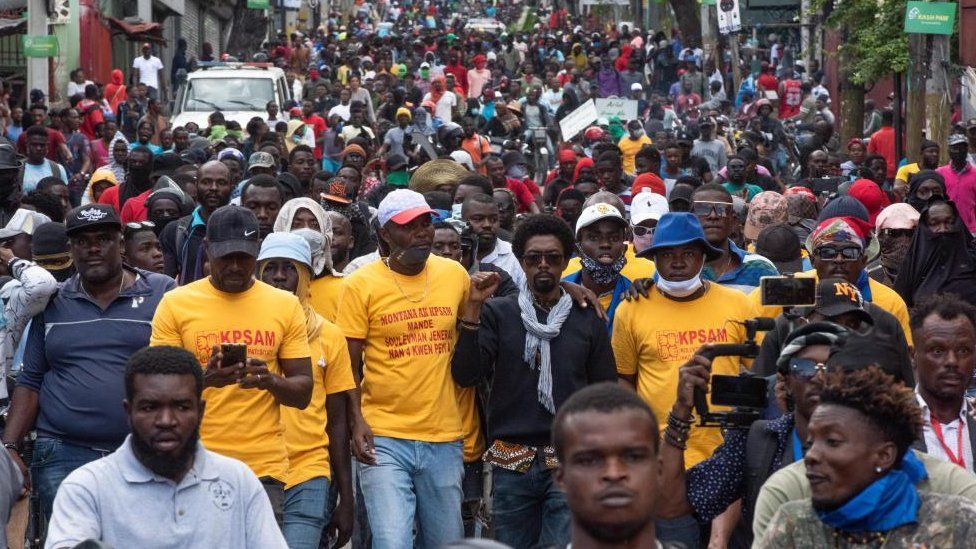Haiti leader urges calm as protesters call for his resignation
- Published

Protesters have been calling for the resignation of Prime Minister Ariel Henry
Haiti's Prime Minister Ariel Henry took to the airwaves on Thursday to urge Haitians to unite to "save" the country.
Mr Henry gave the national address as violent protests calling for his ouster mounted.
Haiti has been mired in gang violence for years.
In the most recent incident, police killed five armed members of an environmental patrol, which some say has morphed into a paramilitary group.
Tensions had been rising in Haiti in the days leading up to 7 February, the day that new presidents are traditionally sworn into office.
Haiti has not had a president since Jovenel Moïse was assassinated by Colombian mercenaries in July 2021.
Mr Henry had been chosen by Mr Moïse as his prime minister just 24 hours before the former president was gunned down. He was sworn into office two weeks after Mr Moïse's assassination.
He has been ruling the country since, repeatedly promising to pave the way for long-delayed elections to be held.
In December 2022, he signed a deal with representatives of political parties and civil society organisations in which he agreed to hold elections in 2023 in order to have a new government ready to be sworn in on 7 February 2024.
But 2023 came and went without elections being held and with Mr Henry arguing that worsening levels of gang violence made it impossible to ensure a free and fair election.
The repeated failure to hold not just presidential but also legislative elections means Haiti has not had a single elected government official since the term of the last elected senators expired in January 2023.
Anger about the political vacuum, as well as at shocking levels of violence, which according to United Nations figures, external have internally displaced almost 314,000 people, have fuelled protests.
Hundreds of thousands of Haitians have been internally displaced by the violence
"The country is being held hostage by gangs. We can't eat. We can't send our children to school," one demonstrator told AFP news agency.
Another protester told AFP that "this Wednesday is D-Day". "It's the day when Ariel Henry must leave office."
The already tense situation has been exacerbated by the return of Guy Philippe, a former police chief who played a key part in the ouster of former President Bertrand Aristide 20 years ago.
Philippe was repatriated to Haiti in November from the United States, where he had served a prison sentence after admitting taking bribes to protect narcotics shipments.
Since his return, he has been sharing video messages on social media in which he calls for a "rebellion" against Mr Henry.
And on Tuesday, Philippe was spotted in the capital, Port-au-Prince, shaking hands with his supporters. He later called into a live radio show, telling listeners that "the fight is just the beginning".
Tensions rose even further as police confronted armed members of Haiti's Security Brigade for Protected Areas, known as BSAP, shooting five of them dead.
Some of BSAP's members are said to be allies of Philippe and the brigade has been accused of having evolved into a paramilitary group rather than an environmental protection agency.
Mr Henry has tried to rein in the brigade's power by sacking the head of the department in charge of the group, but that move just further angered its members.
He has also called on the United Nations to dispatch an international force to Haiti to help control the gangs, but so far only Kenya has promised to send officers.
And even Kenya's help hangs in the balance after a court blocked the deployment.
Related Topics
- Published31 January
- Published16 November 2023
- Published18 August 2023